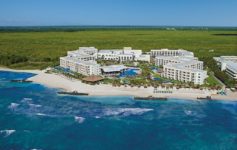Two Princeton graduates are betting on remote learning to grow but with colleges closed, they think they can offer a dorm experience in desirable locations using hotels.
If you are considering booking travel or signing up for a new credit card please click here. Both support LiveAndLetsFly.com.
If you haven’t followed us on Facebook or Instagram, add us today.
College Campuses Closed, Remote Learning/Remote Campus
Some college campuses will be closed this fall due to the coronavirus crisis. Without an ability to attend classes in person, many traditional students are turning to remote learning, whether they like it or not.
But some traditional students benefit from being around other students. Unlike traditional campuses where students can collaborate in person with classmates, remote campuses offer a learning environment with other students but the same collaboration limitations we all experience right now.
A pair of Princeton graduates have founded a company that has secured (likely leased) two hotels, one each in Fayetteville, AR and Waikiki, HI. The U Experience will not operate the hotels or in-house restaurants but instead, leave that to the hospitality managers of the property. It’s not clear (though unlikely) if the hotel will continue to serve regular guests.
Remote working, living, and now studying is a growing trend. It’s one this site has covered many times in the past for those choosing to continue their work lives while traveling or living elsewhere.
Doomed From The Start
Two Princeton graduates starting a business is a reasonably good start to a plan. But other than the fact that two attended the Ivy League school, there is little else that qualifies the pair to operate this business. As the linked article notes:
“Neither has a background in higher education, hospitality, or event-planning. Bragg said that the duo “did go through Princeton together, and we were able to have an understanding of the college experience firsthand, and we understand the value of it.”
While they don’t refer to the hotels as a “dorm” they do refer to the property as a “campus.” But unlike most dorms on college campuses, The U Experience includes only limited food and beverage. Food in Fayetteville, Arkansas will be affordable (but not free) but in Waikiki, Hawai’i, food cost will be substantial if you want meals other than when they are offered and more than twice a day. As the property is a hotel, it’s unlikely that rooms will have kitchenettes despite each student occupying their own room. Some dorms have moved away from this model and in Hawai’i that will be essential.
Applicants must be 21 years old or older to qualify. The U Experience is avoiding underage drinking liability but most on-campus residents are occupied by underclassmen. On-campus living is intended to provide a safe landing for both parents and new adults adjusting to living on their own without the burden of unmitigated costs and fully caring for themselves, their studies and a household. Excluding most underclassmen diminishes their market substantially. While they list “post-graduate,
Many students utilize FAFSA and government-subsidized financing to pay for their college experience. The U Experience likely won’t qualify for funding so this would be an expense that would have to be paid out-of-pocket initially.
There are some reasonable and some unreasonable demands the U Experience adds (emphases mine):
Submit to a The U Experience designated Covid-19 test. The test will take place at a reasonable date soon after the student’s admission into The U Experience program. A reasonable date shall be any date that guarantees results will be received and submitted to The U Experience prior to the start of the semester. Students are expected to take all reasonable steps to self-quarantine in the period of time between testing and arrival on campus. This includes the use of a mask and all other reasonable safety precautions necessary to prevent exposure. (That means masks in common areas)
Students will be permitted to make online purchases for delivery or arrange, through staff, off campus purchases, however, no student will be allowed to leave the campus to purchase goods, essential or non-essential. (Why can’t residents leave to make purchases?)
The U Experience reserves the right to take all necessary precautions, including quarantine, should a student arriving on campus be suspected of any medical illness or exposure to any contagious illness. (They can contain residents in their room if they suspect a resident of a sniffle if they choose.)
To ensure the safety of all campus occupants (student and staff), students will not be permitted to return to campus during the semester should they leave for any non-The U Experience authorized excursion at any time. (No holiday breaks, can’t leave campus?)
The U Experience reserves the right to command the deletion or alteration of any media that was recorded or otherwise gathered within the confines of campus. (Your right to free expression as elsewhere outlined only applies as long as The U Experience approves)
The rights of students to share images and videos from their experience to social media shall not be infringed, but students are expected to provide The U Experience with any available raw video and image files that depict the property or any The U Experience programming. We reserve the right to request any such content. (Your media is not your media, it’s their marketing and they own it.)
The site adds that the costs are “base rates” (I am sure they have suites and ocean views available for more) and the semester runs September 1st to November 26th. Therefore, one could assume that the $12,000 base rate for Fayetteville and $15,000 base rate for Waikiki are solely for one semester. That is substantially higher than most public and private universities (though perhaps not Ivy League schools.) In Arkansas, $4,000/month is absurdly high. In Hawai’i, AirBnB properties can be found for as little as $1700/month or $5,563 for the semester.
Here’s my AirBnB referral link if you’d like to benefit us both with a sign-up. It’s worth noting that if you instead booked an AirBnB and made your own “U” experience, you’d earn 3x points on your accommodation spending with some Chase Ultimate Rewards cards (food too.)
Conclusion
For some wealthy students (and their parents), campus closures cause concern, frustration and may adversely affect the student’s experience. Remote working and studying opportunities create unique advantages and disadvantages for students. However, The U Experience requirements and cost are prohibitive. It seems like another good travel idea (and solution for an otherwise empty hotel) managed by two graduates with nothing more than a concept. The application and surrender of rights should cause any applicants to seriously consider the non-monetary costs of attendance.
What do you think? Would you utilize The U Experience for yourself, your children or family members? Will other remote campuses open up in a similar fashion?




That referral link seems unnecessary. Is that consistent with LALF’s advertising policy?
If you want to include random tangents with links earning you referral fees, go work for TPG.
The Hawaii idea might work with some rich students – reminds me of the “semester at sea” program. We will have to wait and see if Hawaii reopens.
Thanks Kyle! I plan to rent out an AirBNB with some friends in Hawaii instead of this outrageously priced model. As an incoming college freshman, this advice is very valuable!
Hope they are using OPM to fund their venture, otherwise might as well set the money on fire for warmth in the winter
Its easy to part a fool from his money. I dont think anyone would be seriously harmed if they did remote learning for a while from their homes.
Yes there could be a market for those who live in low cost / cramped housing who need this. But then they wont e able to pay 4000 USD a month